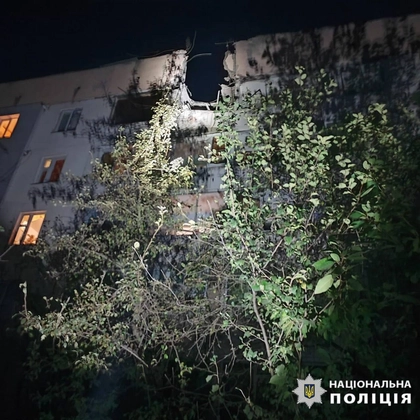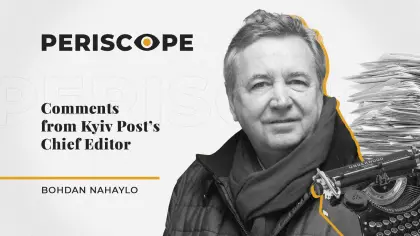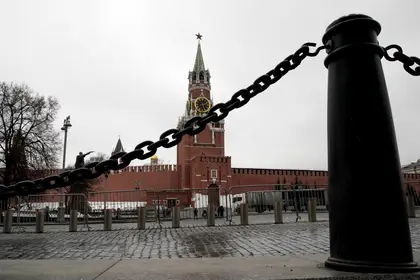Greetings. Through the chief editor’s periscope, I am again surveying the scene, and here are some random observations.
It’s good to see the NATO General Secretary Jens Stoltenberg in Kyiv. It sends a strong signal not only to Ukrainians but to skeptical parties about how the West views Ukraine together with the public re-affirmation that there is broad consensus that Ukraine should be brought into NATO as soon as its feasible.
JOIN US ON TELEGRAM
Follow our coverage of the war on the @Kyivpost_official.
One has to be realistic, of course, and we know that it’s extremely difficult to envisage Ukraine becoming a NATO member while Russia’s war against it continues. The German Defense Minister has immediately reiterated this. But it’s nevertheless heartening to hear from the general secretary that NATO’s members anticipate Ukraine’s acceptance into its alliance as soon as Russia is put in its place.
Ukraine, after all, is the missing vital piece in Europe’s security architecture in the east. It can no longer be simply written off as an expedient buffer zone. It continues to fight hard and heroically for its sovereignty, territorial integrity and European self-identification. The Poles, Balts, Romanians Czechs and Slovaks have no problem understanding this.
Belarusian opposition leaders also acknowledge that their country’s future lies with Europe and not Russia, and hope that Ukraine’s victory will sweep away both the Lukashenko dictatorial regime and Russian imperial tutelage.

Kyiv Hit by Massive Drone Attack as Russian Strikes Target Multiple Ukrainian Cities
In the current process of Europe’s re-configuration, it’s clear that the continent’s security and wellbeing depend on Europe’s borders and security being established on the borders with Eurasia, which Russia, with its despotic and imperialist values, represents. Finland and Sweden have acknowledged this by opting to join NATO.
Turkey still plays its self-serving political games, but at the end of the day remains a NATO member and has been supportive in its own way. For example, by insisting that Ukraine’s sovereignty and territorial integrity be respected (thereby recognizing that Crimea is Ukraine’s) and helping to negotiate the grain deal that has circumvented Russia’s attempts to block the export of agricultural products from Ukraine’s ports.
Of course, it’s heartening to see more and more sophisticated weapons arriving from the West to bolster Ukraine’s defense capacities, but also to make its anticipated counteroffensive possible.
There has been a great display of Western unity and purposefulness in this regard of late, and it should belie complaints that the support Ukraine needs is insufficient or late in coming. Realities are what they are both in the Euro-Atlantic states that support Ukraine (economic difficulties, approaching elections and populism, Ukraine fatigue, etc.) and within Ukraine and its own forces, too.
Matters are not helped by the recent speculation about if and when Ukraine’s counteroffensive will finally be launched. And, of course, the recent leak of US secret documents has only complicated matters.
But it’s also clear that in Moscow the Putin regime is under increasing pressure as its unexpectedly long and increasingly tedious war against Ukraine exacts an ever-growing toll at home – economically, politically, socially, and in terms of lost self-confidence and prestige – as well as isolation abroad.
The key question here is not so much how successful any Ukrainian counteroffensive might be, but if the latter-day Caligula in the Kremlin will be able to survive the disenchantment and sense of insecurity of his own political, military and economic Praetorian Guard.
And the signs for Vladimir Putin are not encouraging. From rifts and losses within Russia’s military potential, sustained economic reversals, the failure to deliver an end justifying the means, to uniting the West against him and losing Moscow’s markets and influence there, and being forced to turn eastward – all this is a serious setback to a tyrant and country wanting to see themselves as a successful, exclusive, expansionist geopolitical giant challenging the international order.
The fact that China, and the likes of Brazil and India are playing along with Russia and pretending to be neutral and mediators, ultimately will not help Moscow in the longer term. For even they are emphasizing respect for Ukraine’s territorial integrity and thereby implicitly condemning Moscow’s imperialistic aggression.
Would, hypothetically, Brazil be prepared to see the region of Rio de Janeiro occupied by a neighboring state, or India to recognize a breakaway Kashmir province aligned with Pakistan? Indeed, how would India react if China suddenly attacked it and rained missiles down on its cities? Would these “non-aligned” states be happy if others proverbially sat it out on the fence?
China is enjoying the moment as it is wooed by some as a self-proclaimed international mediator while all the same proclaiming that its close alignment with Russia heralds a new era in their bilateral relations. And its menacing behavior towards Taiwan generates concern and uncertainty.
There’s also the unpredictable and seemingly ultimately self-serving behavior of France’s President Emmanuel Macron to consider. He appears to be increasingly adopting the role assumed by his predecessor, President Charles de Gaulle, in warming up to Russia and China and at the expense of his European partners in NATO.
A self-avowed staunch supporter of Ukraine, Macron is beset with serious domestic problems. Meanwhile in the external sphere he’s touting the potentially divisive idea of affirming the EU’s strategic autonomy, and thereby suggesting distancing it from the US, while at the same time playing up to China by proposing a mutually “acceptable” peace plan for ending Russia’s war against Ukraine.
And there are potential complications connected with the results from forthcoming elections of one sort or another in Turkey, Poland and the mid=terms in the US. Likewise, the unexpected temporary position adopted by Ukraine’s neighbors, and seemingly supported by the EU leadership, on stopping grain imports from beleaguered Ukraine is hardly welcome.
Nearer to home, there are encouraging developments and some dubious ones.
The Zelensky administration has continued to combat corruption, clip the wings of oligarchs, and subdue pro-Russian forces such as the Ukrainian Orthodox Church of the Moscow Patriarchate (UOC-MP). Recent moves against high-ranking officials suspected of corruption and treacherous behavior, as well as against the UOC-MP and its leading wealthy associate, tycoon Vadym Novynskyi, attest to this.
But certain things nevertheless continue to remain murky, and there being a war does not serve as an excuse.
Then there is the issue of Belarus, as well, as we have been reminded again this week with the Ukrainian ambassador being recalled from Minsk because of Lukashenko’s meetings with a Russian proxy from the occupied territories in the Donbas.
Why has Ukraine continued to maintain diplomatic relations with the Lukashenko regime in Belarus, which not only terrorizes its own population keeping some 1,500 political prisoners behind bars, but also acts as a Russian vassal allowing their country to be used as a staging area for Russian forces against Ukraine?
Considering the fact that Kyiv has called for the most severe sanctions against Moscow, such a position reeks of double standards. Why not officially recognize the Belarusian democratic opposition instead of maintaining a token ambassador in Minsk, and appeal directly to the Belarusian population to oppose its Russian puppets and side with Ukraine in a common case for independence, democracy and European values? For our freedom and theirs!
Or is there something we don’t know, but should be aware of? If so, it’s high time we knew.
You can also highlight the text and press Ctrl + Enter






